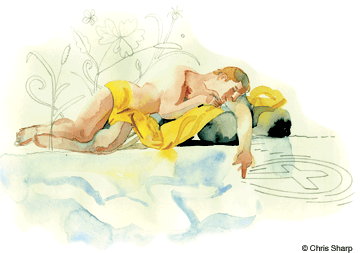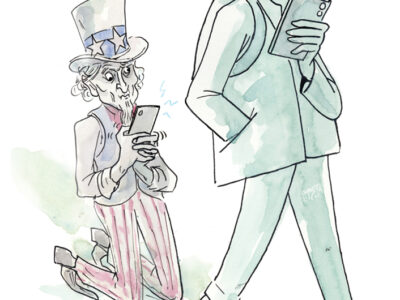
American Christians are as American as they are Christian.
By Alan Wolfe | In the course of my research into American moral values, I recall interviewing numerous conservative Christians. “I was a lost soul,” they frequently told me, “leading a false life; then I discovered Jesus and learned who I really am and what I really believe.” I also held interviews with gay Americans. “I was a lost soul,” they would say, “leading a false life, until I ‘came out’ as gay and discovered who I really was and how I ought to live.” No two groups of Americans are as polarized from each other as gays and conservative Christians. Homosexuality is a sin, say the latter. Religious believers are intolerant and hateful, say the former. If both could discover that they talk in exactly the same language of American individualism and self-discovery—that both are strongly shaped by a common American culture—perhaps they would both come to understand the many fascinating ways in which American culture and American religion influence each other.
Two images of the United States tend to dominate the way Americans are perceived both by themselves and by the world outside their borders. In one, the United States is viewed as the harbinger of modernity; everything new, from shopping malls to gas-guzzling SUVs, originates in America before spreading to everywhere else in the world. From this perspective, Americans are viewed as people who can never leave well enough alone. They must always tinker and reinvent, destroying traditions and time-honored practices as they do.
At the same time, the United States, especially in the age of George W. Bush, is pictured as the most religious of all the Western liberal democracies. In this view, conservative religious believers are understood to be the enemies of everything modern and progressive. They do not accept Darwin. Their preaching emphasizes sin and damnation. They want to see wives stay at home and children obey their parents. To make the world a better place, as the image of them holds, we ought to go backwards rather than forwards.
From a theoretical perspective, both these images cannot be true at the same time. Yet perhaps the theories are wrong. For modernity and tradition exist side-by-side, not only in America, but in Americans. The United States is indeed a very religious society, especially when compared to European countries. But it is also a modern society and religious believers, even very conservative ones, contribute to its sense of dynamism and innovation.
Consider megachurches, those huge and welcoming places of worship that can increasingly be found in the “exurbs,” newly built communities far outside the city limits of Memphis or Denver. Enter a megachurch and you will not find an organ; music is provided by a rock band flashing the lyrics of the various praise songs on a huge screen using Microsoft PowerPoint. The preacher, more knowledgeable about psychology than theology, will deliver not a thundering jeremiad in the style of Jonathan Edwards but an uplifting sermon reminding all and sundry of Jesus’ love. You will be so captured by the warmth and friendliness of the place that you probably never notice the absence of a cross outside; megachurches do not want to send a message to non-believers that they might be unwelcome.
Doctrine plays a relatively small role in the religious revival in which megachurches play a prominent role. “Some people really like a high-Episcopal-type thing, and other people like to swing from chandeliers and leap out of windows,” said one pastor, as if his job were to respond sympathetically to either inclination. Americans switch their religious denominations so frequently that they can be forgiven—if, say, they are Presbyterians—for not knowing that the great doctrinal influence on their church, Calvinism, emphasizes predestination, a doctrine that flies in the face of the American ideology of self-reliance. I asked the pastor of a church outside Cincinnati to summarize his message. “Love, love, love, love, truth,” is how he responded. It is more important to feel part of Christ’s kingdom than to reflect on what kind of kingdom it is.
Religious believers, especially those attracted to evangelical Protestantism, are typically described as “traditional” in their attitudes. Yet almost nothing is traditional about them. If I were asked to coin a term that was meant to be the polar opposite of traditionalism, the one I would use is the very term conservative evangelicals use to describe themselves: born-again. To be traditional is to accept a way of life from one’s parents and to feel obligated to pass it on, unchanged, to one’s children. This is precisely what evangelicals do not do. They value authenticity of belief over tradition: If your parents—or even you yourself earlier in life—believed in the wrong thing, your obligation is to start all over again by experiencing a rebirth in Christ. No wonder that there are always new evangelical movements being created or that so many evangelical churches stand free of any denominational ties. Like President Bush, who rejected his father’s more established Episcopal faith for his own evangelical one, conservative Protestants are seekers after spiritual renewal, not inheritors of the past.
Americans are so frequently described as churchgoing that it may come as a surprise to discover that some of them do not go to church, not because they are atheists, but because they want to pray at home. “Jesus had no church,” says one adherent to the home-church movement, adding that it was only with St. Paul that Christianity began its commitment to institutions. Like home-schoolers, who withdraw their children from public schools so that parents can be responsible for what they learn, home-churchers band together in small groups to read the Bible and to apply its teachings to the world around them. While they are correct that Jesus did not have a church, it is also true that he did not have a computer. These people do; Internet connections and web pages take the place of pews and pulpits. Home churches are a very small speck on the American political landscape, but their combination of the old and the new is very characteristic of nearly all of America’s religious believers.
When people pray, whether at home or in church, what do they ask of God? Sociologists who ask them generally discover that while people pray to an almighty being, they ask for this-worldly things: help with a real-estate closing, an advancement in one’s career, a healthy recovery from a cancer operation. One conservative Lutheran theologian, Marva Dawn, has examined the worship styles of evangelicals and come away disappointed. Borrowing a term from the late social critic Christopher Lasch, she sees a “culture of narcissism” among her flock, a sense that Christians all too often focus on their own needs and all too infrequently give themselves over to God’s greater glory.
Perhaps this culture of narcissism helps explain why the books most often sold in conservative Christian bookstores are not collections of Luther’s sermons or St. Augustine’s Confessions, but diet and exercise books such as Slim for Him and More of Him, Less of Me. “When you give your heart to God,” as the author of the most popular Christian diet program has put it, “the body will follow.” A hundred years ago, conservative Christians believed that making yourself attractive was a sin; now they believe that a loving God wants them to look as good as possible. In the United States you can join a Christian fitness studio where the person exercising on the stationary bicycle next to you will share your faith in the Lord.
There are, I hasten to add, fundamentalists in the United States who reject all these trends in favor of the old-fashioned religion. But they are the exception, not only among all religious believers, but also among those who call themselves conservative or evangelical. Adhering strongly to the “Great Commission”—“Go out and make disciples of all nations,” as the Book of Matthew puts it—evangelicals are committed to spreading the good news of their faith. To do that, they cannot reject the culture around them. But in accepting American culture, they run the risk of coming under its influence. There seems little doubt that those risks are real. American Christians are as American as they are Christian; the two go together, and no one can separate them.
There is every reason to believe that evangelicals, who contributed so much to the reelection of George W. Bush in 2004, will demand that the president be responsive to their concerns. When it comes to politics, those concerns are quite conservative; evangelicals do not like homosexuality and abortion and will ask for Supreme Court judges who will restrict the culture of permissiveness they see around them. George W. Bush is a politician, and a very successful one at that, so he is unlikely to take steps too far in the direction of his most conservative religious supporters for fear of alienating others, yet there is also no doubt that under his leadership the United States will not be engaging in much stem-cell research (except in states like California that approve of it) or spending much on birth-control programs abroad.
But when it comes to culture, it would be wrong to conclude that the newfound political influence of evangelicals is likely to lead to a revival of old-fashioned values, forms of entertainment, and traditional sex roles. Evangelicals are too much part of the culture of modernity to allow their president, or anyone else, to lead them in directions that undermine their capacity to use their religion to strengthen their sense of self-esteem. For better or worse, religious believers are, except for their frequent tendency to proclaim their faith in God, like everyone else in America. I, for one, think that is for the better.
Alan Wolfe Gr’67 is director of the Borsoi Center for Religion and American Public Life at Boston College and author of The Transformation of American Religion: How We Actually Live Our Faith (Free Press, 2003).




